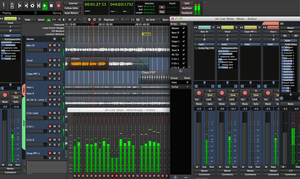Ardour (software)
Ardour is a hard disk recorder and digital audio workstation application that runs on Linux, macOS, FreeBSD and Microsoft Windows. Its primary author is Paul Davis, who is also responsible for the JACK Audio Connection Kit. Ardour is intended to be digital audio workstation software suitable for professional use.
 Ardour 5.12 | |
| Original author(s) | Paul Davis |
|---|---|
| Developer(s) | David Robillard, Robin Gareus, Nick Mainsbridge, Colin Fletcher, Ben Loftis, Tim Mayberry. |
| Initial release | 23 September 2005 |
| Stable release | 6.0 (May 22, 2020) [±] |
| Preview release | 6.0-rc1 (April 19, 2020) [±] |
| Repository | |
| Written in | C++ (GTK+) |
| Operating system | FreeBSD, Linux, macOS, Microsoft Windows |
| Available in | English |
| Type | Digital audio workstation |
| License | GPLv2+ |
| Website | www |
Released under the terms of the GNU General Public License (version two or any later version), Ardour is free software.[1]
Ardour 6.0 was released on 22nd May 2020.
Features
Recording
Ardour's recording abilities are limited by only the hardware it is run on; there are no built-in limits in the software. When recording on top of existing material, Ardour can do latency compensation, positioning the recorded material where it was intended to be when recording it. Monitoring options include self-monitoring, use of external hardware (a feature dependent on sound card support) or specialised product; e.g. JACK Audio Connection Kit. Self-monitoring makes it possible to apply plug-in effects to the signal while recording in real-time. Using the audio server JACK, Ardour can record both from the audio card and compatible software concurrently.
Mixing
Ardour supports an arbitrary number of tracks and buses through an "anything to anywhere" routing system. All gain, panning and plug-in parameters can be automated. All sample data is mixed and maintained internally in 32-bit floating point format.[2]
Editing
Ardour supports dragging, trimming, splitting and time-stretching recorded regions with sample-level resolution and has a possibility to layer regions. It includes a crossfade editor and beat detection. Ardour has unlimited undo/redo and a snapshot feature for storing the current state of a session to a file for future reference.
Mastering
Ardour can be used as an audio mastering environment. Its integration with the JACK Audio Connection Kit makes it possible to use mastering tools such as JAMin to process the audio data. The output of Ardour's mixer can be sent to JAMin and/or other audio-processing software to be processed and/or recorded. It can also export TOC and CUE files, which allows for the creation of audio CDs.
Compatibility
Ardour attempts to adhere to industry standards, such as SMPTE/MTC, Broadcast Wave Format, MIDI Machine Control and XML.
Ardour has been tested on GNU/Linux, on the x86-64, x86, PowerPC and ARM (for at least version 3) architectures, Solaris, macOS on Intel and PowerPC, Windows on Intel architectures and FreeBSD. It takes advantage of multiprocessor and multicore SMP and real-time features of these operating systems. Support is limited on operating systems other than Linux and macOS, however.
Ardour 5.12 is available for Linux, macOS and Windows.
Plug-ins
Ardour relies on plug-ins to enable many features, from audio effects processing to dynamic control. It supports the LADSPA and LV2 plug-in architectures on Linux and additionally Audio Units on macOS. Calf Studio Gear can be used through LV2.[3] Using Steinberg's VST plug-ins with Ardour on Linux and FreeBSD is possible on Windows and Linux with the help of Wine.
Import and export
Ardour supports exporting whole sessions or parts of sessions and importing audio clips into sessions from more than 30 different audio file formats. This can be done using Ardour's built-in audio file database manager or directly from an ordinary file browser.
Supporting companies and future
SAE Institute provided corporate support for Ardour up until February 2009. The aim of the initiative was to provide a more integrated experience on Mac OS X and the development of a version tailored towards beginner students.
Solid State Logic employed Paul Davis to work full-time on Ardour during the development of version 2. This support lasted through to the end of 2006.
Harrison Audio Consoles has been a supporter of the Ardour project since early 2005. Harrison's destructive film dubber, the Xdubber, is based on Ardour. The Xdubber also serves as a customizable platform for enterprise-class digital audio workstation (DAW) users.
See also
- JACK Audio Connection Kit, a real-time low latency audio server.
- Comparison of digital audio editors
- Comparison of free software for audio
- Linux audio software
- List of free and open source digital audio workstation software
- List of music software
Notes
References
Articles
- Hinkle-Turner, Elizabeth (September 2009). "Ardour et al., or Free and Easy Laptop Pro Audio: An Essay Perspective from a desperate working mother composer". eContact! 11.3 — Open Source for Audio Application. Canadian Electroacoustic Community.
- Nettingsmeier, Jörn (September 2009). "Ardour and Ambisonics: A FLOSS approach to the next generation of sound spatialisation". eContact! 11.3 - Jörn Nettingsmeier - Ardour and Ambisonics. Canadian Electroacoustic Community.